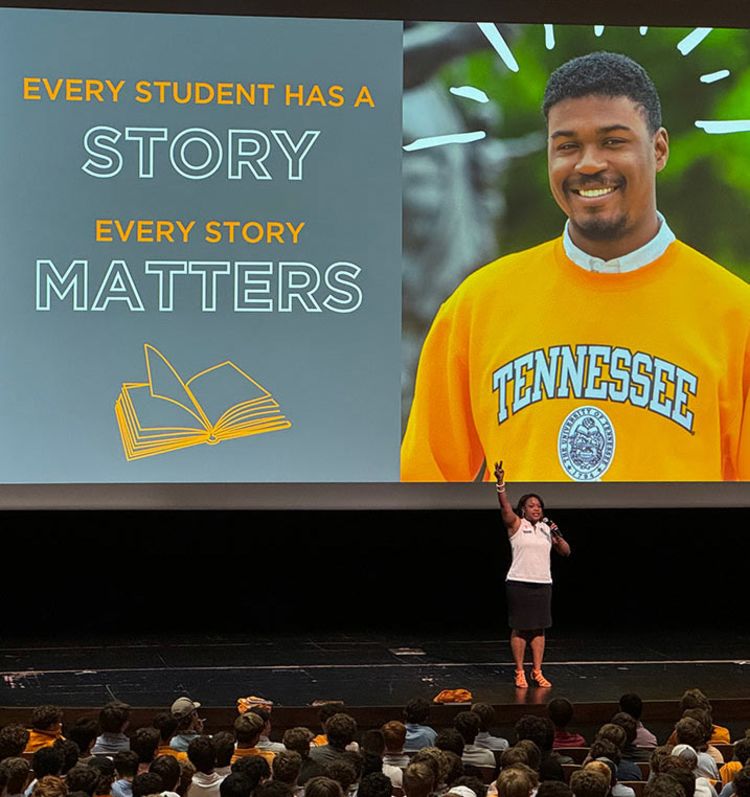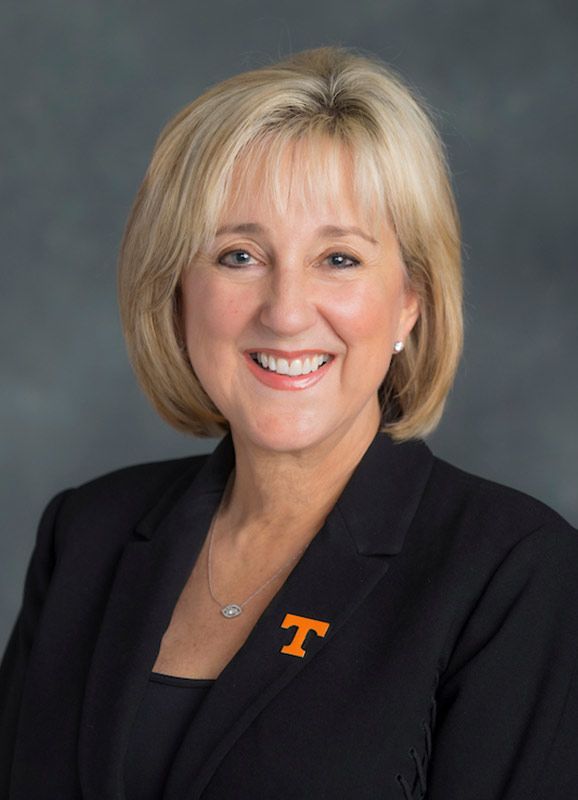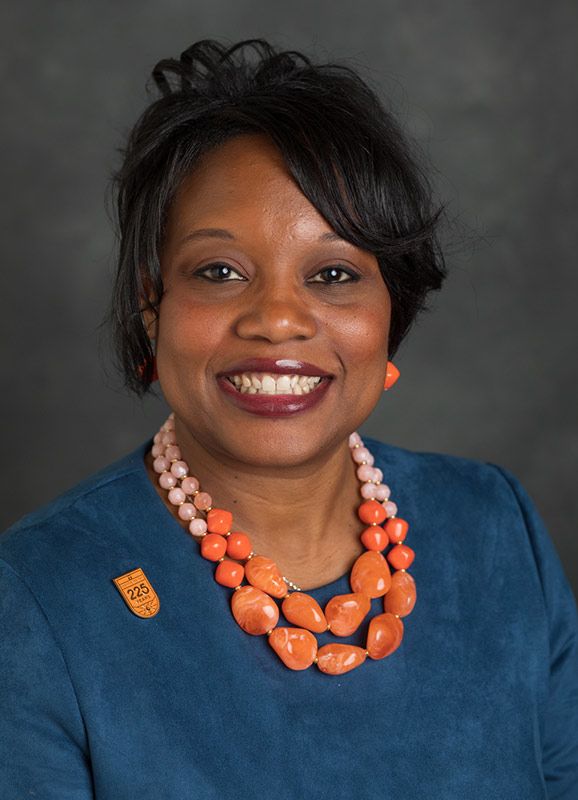A new recipe for student success at UT Knoxville

Earlier this fall we celebrated our most recent Peyton Manning Scholars, recipients of one of the most prestigious academic awards here at the University of Tennessee, Knoxville.
During the event, Cade Simmons from rural Van Buren County said he chose UT over Harvard because of our culture and our commitment to student well-being.
Nicole Gann, a pre-med biology major from Harriman, a small town on the Cumberland Plateau, told the gathered audience, “Where I am from, few people get opportunities like this.”
Like every student here at UT, Cade and Nicole have trusted us with their educations and their futures. We take that seriously, and it’s why we’ve spent the past five years building both the university culture and the institutional support to ensure that every student who arrives here at UT can thrive.
Our efforts are paying off with unprecedented gains at UT.
Retention has risen five points to a school record 92%, and the six-year graduation rate has reached a high of 74%. Our students are graduating faster than ever, with a four-year graduation rate that has moved from 54% in 2018 to 62% this fall.
Those improvements have created capacity that has allowed us to grow our enrollment and provide more opportunities for a UT education to more students while producing more graduates to bolster the state’s workforce.
Three principles for student success
The two of us arrived in Knoxville sixth months apart and immediately observed our student retention was lower than it should be compared to our peers, especially given the high-quality students UT has always attracted.
In the early months of 2020 we launched the Division of Student Success. During the most challenging year any of us have ever seen in higher education — at the height of the pandemic — we began building a comprehensive network of student resources.
Our goal from the start was to champion the success of every student.
We moved forward with three basic principles: build students’ confidence, set high expectations and create the structures to support students.
Amber Williams, Vice Provost for Student Success, leads a success session designed to introduce first-year students to academic resources and empower them to take control of their collegiate journey.
Amber Williams, Vice Provost for Student Success, leads a success session designed to introduce first-year students to academic resources and empower them to take control of their collegiate journey.
Earlier this fall we celebrated our most recent Peyton Manning Scholars, recipients of one of the most prestigious academic awards here at the University of Tennessee, Knoxville.
During the event, Cade Simmons from rural Van Buren County said he chose UT over Harvard because of our culture and our commitment to student well-being.
Nicole Gann, a pre-med biology major from Harriman, a small town on the Cumberland Plateau, told the gathered audience, “Where I am from, few people get opportunities like this.”
Like every student here at UT, Cade and Nicole have trusted us with their educations and their futures. We take that seriously, and it’s why we’ve spent the past five years building both the university culture and the institutional support to ensure that every student who arrives here at UT can thrive.
Our efforts are paying off with unprecedented gains at UT.
Retention has risen five points to a school record 92%, and the six-year graduation rate has reached a high of 74%. Our students are graduating faster than ever, with a four-year graduation rate that has moved from 54% in 2018 to 62% this fall.
Those improvements have created capacity that has allowed us to grow our enrollment and provide more opportunities for a UT education to more students while producing more graduates to bolster the state’s workforce.
Amber Williams, Vice Provost for Student Success, leads a success session designed to introduce first-year students to academic resources and empower them to take control of their collegiate journey.
Amber Williams, Vice Provost for Student Success, leads a success session designed to introduce first-year students to academic resources and empower them to take control of their collegiate journey.
Three principles for student success
The two of us arrived in Knoxville sixth months apart and immediately observed our student retention was lower than it should be compared to our peers, especially given the high-quality students UT has always attracted.
In the early months of 2020 we launched the Division of Student Success. During the most challenging year any of us have ever seen in higher education — at the height of the pandemic — we began building a comprehensive network of student resources.
Our goal from the start was to champion the success of every student.
We moved forward with three basic principles: build students’ confidence, set high expectations and create the structures to support students.
We build confidence
Every first-year student takes a CliftonStrengths assessment and receives personalized coaching on how to put their strengths to work. When they begin to understand their unique talents, students learn to leverage them to meet their academic, career and personal goals.
Faculty in some departments are integrating a strengths-based approach in the classroom, and many of our staff have taken their own strengths assessments. A learning environment centered on what students can do rather than what they cannot do empowers them to build their own confidence one success at a time.
This approach builds resilient students who thrive on campus and in the classroom and who go on to be capable leaders in the workplace.
We set high expectations
We challenge every student because we know those expectations can be met. When students arrive on campus, they begin a six-month transition program to help them adjust to college life.
Students are handed an attractive, old-school “planner” and meet with student success professionals—who refer to students as “scholars” and help them begin to use it to set goals and build a plan for their first semester.
This year UT saw a record of nearly 60,000 applications for a class of 6,800 first-year students. Our students would not be here if they couldn’t succeed here. Even as the university continues to see record enrollments year after year, we know it’s not enough to get students here. We need them to leave here armed with the skills and credentials they need to have the careers they want.
Around 8,000 students take the pledge to become Volunteers on Torch Night—one of UT’s most treasured rites of passage.
Around 8,000 students take the pledge to become Volunteers on Torch Night—one of UT’s most treasured rites of passage.
We create structures for students to thrive
One of the first initiatives of the Division of Student Success was to assign every first-year student a Vol Success Team with three members — a dedicated academic advisor, a mentor and a strength coach. When students encounter a challenge, they know exactly whom to call.
As our support network has grown, we’ve added resources and extended service hours and locations to make sure students can get the help they need when they need it.
We created new departments around individual communities for veterans and first-generation students, focusing on personalized engagement, targeted support and customized programming. Recognizing that education happens both within and outside the classroom, we’re weeks away from launching Vol Edge, an immersive program to ensure that students are career ready when they leave college.
About the Authors
Chancellor Donde Plowman
Dr. Donde Plowman has served since 2019 as chancellor of the University of Tennessee, Knoxville, the state’s flagship land-grant research university.
In that time the university has set new records in student retention and graduation, research, instructional spending, alumni giving, and state support.
Shortly after her arrival at UT, Plowman created the Division of Student Success to ensure that students receive a wide range of support as they navigate college life. The university has seen significant results in retention, persistence, and graduation rates and captured the attention of peers across higher education.
Under five years of Plowman’s leadership, the university has also grown its research expenditures to a record $380 million by shifting its focus from individual efforts to big collaborative projects. This ambition has fueled more creative solutions and new technologies, as well expanded innovation and economic development partnerships with companies including AT&T, Eastman, and Volkswagen.
Plowman’s role as chancellor includes oversight of Tennessee Athletics, an operation exceeding $200 million, to which she has provided decisive and timely leadership. In 2020 she was selected by her peers in the Southeastern Conference to represent the SEC as a member of the NCAA Presidential Forum, and in 2023 she was elected vice president of the SEC Executive Committee. Plowman is known across the country as an advocate for student-athletes by supporting their pursuits on and off the field.
Before becoming chancellor, Plowman served as dean of the College of Business and then executive vice chancellor at the University of Nebraska–Lincoln. She was previously a department head at UT. Plowman is a globally recognized organizational scientist whose scholarship includes the topics of leadership, change management, and strategic decision-making.
Vice Provost Amber Williams
Dr. Amber Williams is a seasoned higher education administrator and visionary leader responsible for the University of Tennessee’s efforts to serve undergraduate scholars and their unique academic goals. She is a globally-recognized expert and highly sought-after keynote speaker for student success initiatives as well as organizational leadership and development, diversity and inclusion, and women in business. Described as a transformative leader, she looks beyond numbers to see scholars as individuals—creating programs and services that support their unique story, prepares them for graduation, and empowers every Volunteer to make a difference in the world.
Through her efforts leading the Division of Student Success, retention rates have jumped to a record-breaking 92%, well above the national average of 75%. Since arriving on Rocky Top in 2020, she’s created and implemented numerous customized programs and data-driven initiatives designed to promote success throughout a scholar’s academic journey. Each program was carefully curated through a student success framework that encourages a strengths-based approach through confidence, high expectations, and individualized structures that ensure every student matters.
Williams came to UT from the University of Nebraska, where she served as their Assistant Vice Chancellor for Enrollment Management and had significant experiences influencing student success initiatives. She earned her bachelor’s in communication studies from the University of Kansas, a master’s in leadership education, and a doctorate in educational administration from the University of Nebraska–Lincoln.
We build confidence
Every first-year student takes a CliftonStrengths assessment and receives personalized coaching on how to put their strengths to work. When they begin to understand their unique talents, students learn to leverage them to meet their academic, career and personal goals.
Faculty in some departments are integrating a strengths-based approach in the classroom, and many of our staff have taken their own strengths assessments. A learning environment centered on what students can do rather than what they cannot do empowers them to build their own confidence one success at a time.
This approach builds resilient students who thrive on campus and in the classroom and who go on to be capable leaders in the workplace.
We set high expectations
We challenge every student because we know those expectations can be met. When students arrive on campus, they begin a six-month transition program to help them adjust to college life.
Students are handed an attractive, old-school “planner” and meet with student success professionals—who refer to students as “scholars” and help them begin to use it to set goals and build a plan for their first semester.
This year UT saw a record of nearly 60,000 applications for a class of 6,800 first-year students. Our students would not be here if they couldn’t succeed here. Even as the university continues to see record enrollments year after year, we know it’s not enough to get students here. We need them to leave here armed with the skills and credentials they need to have the careers they want.
Around 8,000 students take the pledge to become Volunteers on Torch Night—one of UT’s most treasured rites of passage.
Around 8,000 students take the pledge to become Volunteers on Torch Night—one of UT’s most treasured rites of passage.
We create structures for students to thrive
One of the first initiatives of the Division of Student Success was to assign every first-year student a Vol Success Team with three members — a dedicated academic advisor, a mentor and a strength coach. When students encounter a challenge, they know exactly whom to call.
As our support network has grown, we’ve added resources and extended service hours and locations to make sure students can get the help they need when they need it.
We created new departments around individual communities for veterans and first-generation students, focusing on personalized engagement, targeted support and customized programming. Recognizing that education happens both within and outside the classroom, we’re weeks away from launching Vol Edge, an immersive program to ensure that students are career ready when they leave college.
Student success belongs to everyone
Finding ways to both personalize the support we offer and scale those resources for a large campus like UT has helped set us apart.
But perhaps what has moved the needle more than anything is the way student success has become both a point of pride and responsibility for the entire university. From our colleagues in Student Life who help nurture a sense of belonging to our faculty who mentor and challenge our students, making sure students have the support they need to thrive is a job that belongs to everyone.
Student success belongs to everyone
Finding ways to both personalize the support we offer and scale those resources for a large campus like UT has helped set us apart.
But perhaps what has moved the needle more than anything is the way student success has become both a point of pride and responsibility for the entire university. From our colleagues in Student Life who help nurture a sense of belonging to our faculty who mentor and challenge our students, making sure students have the support they need to thrive is a job that belongs to everyone.
This custom content is sponsored by The University of Tennessee Knoxville and developed by Inside Higher Ed's sponsored content team. The editorial staff of Inside Higher Ed had no role in its creation.
About the Authors
Chancellor Donde Plowman
Dr. Donde Plowman has served since 2019 as chancellor of the University of Tennessee, Knoxville, the state’s flagship land-grant research university.
In that time the university has set new records in student retention and graduation, research, instructional spending, alumni giving, and state support.
Shortly after her arrival at UT, Plowman created the Division of Student Success to ensure that students receive a wide range of support as they navigate college life. The university has seen significant results in retention, persistence, and graduation rates and captured the attention of peers across higher education.
Under five years of Plowman’s leadership, the university has also grown its research expenditures to a record $380 million by shifting its focus from individual efforts to big collaborative projects. This ambition has fueled more creative solutions and new technologies, as well expanded innovation and economic development partnerships with companies including AT&T, Eastman, and Volkswagen.
Plowman’s role as chancellor includes oversight of Tennessee Athletics, an operation exceeding $200 million, to which she has provided decisive and timely leadership. In 2020 she was selected by her peers in the Southeastern Conference to represent the SEC as a member of the NCAA Presidential Forum, and in 2023 she was elected vice president of the SEC Executive Committee. Plowman is known across the country as an advocate for student-athletes by supporting their pursuits on and off the field.
Before becoming chancellor, Plowman served as dean of the College of Business and then executive vice chancellor at the University of Nebraska–Lincoln. She was previously a department head at UT. Plowman is a globally recognized organizational scientist whose scholarship includes the topics of leadership, change management, and strategic decision-making.
Vice Provost Amber Williams
Dr. Amber Williams is a seasoned higher education administrator and visionary leader responsible for the University of Tennessee’s efforts to serve undergraduate scholars and their unique academic goals. She is a globally-recognized expert and highly sought-after keynote speaker for student success initiatives as well as organizational leadership and development, diversity and inclusion, and women in business. Described as a transformative leader, she looks beyond numbers to see scholars as individuals—creating programs and services that support their unique story, prepares them for graduation, and empowers every Volunteer to make a difference in the world.
Through her efforts leading the Division of Student Success, retention rates have jumped to a record-breaking 92%, well above the national average of 75%. Since arriving on Rocky Top in 2020, she’s created and implemented numerous customized programs and data-driven initiatives designed to promote success throughout a scholar’s academic journey. Each program was carefully curated through a student success framework that encourages a strengths-based approach through confidence, high expectations, and individualized structures that ensure every student matters.
Williams came to UT from the University of Nebraska, where she served as their Assistant Vice Chancellor for Enrollment Management and had significant experiences influencing student success initiatives. She earned her bachelor’s in communication studies from the University of Kansas, a master’s in leadership education, and a doctorate in educational administration from the University of Nebraska–Lincoln.










